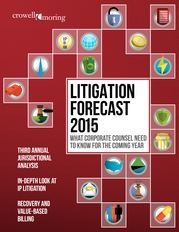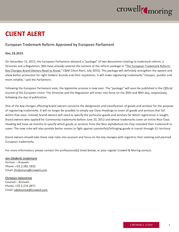Biosimilars: If You Don’t Dance the Patent Dance, You Have to Wait Until the FDA Approves Your Moves – July 23, 2015
Crowell & Moring
Description
The 180-Day Notice Provision Must Occur After FDA Approval
In proceedings below, the district court had held that the 180-day notice could be given in advance of FDA approval. See the
district court ruling. The Federal Circuit overturned that portion of the decision, holding that notice can only be given for
"licensed products" – i.e. those licensed for marketing by the FDA.
Amgen v. Sandoz, Slip Op. at 16-17.
Writing for the majority, Judge Lourie noted that the statute discusses only "licensed products," not "the biological product that is the subject of " the application, as that term is used elsewhere in the statute. Judge Lourie furhter noted that by so holding, the Court would not be tacking on an "extra" 180 days of exclusivity for future reference product holders because "[t]hat extra 180 days will not likely be the usual case, as aBLAs will often be filed during the 12-year exclusivity period for other products." Id. at 18.
In dissent, Judge Chen, however, pointed out that the, "practical consequence of the majority's interpretation is that (l)(8)(A) provides an inherent right to an automatic 180-day injunction," without providing a supporting basis in the statutory language. Instead, Judge Chen would have dissolved the injunction pending appeal. This decision clarifies two related issues of first impression related to the BPCIA, namely the consequences of a biosimilar applicant's failing to disclose its aBLA and what effect that failure will have on the 180-day notice provision. But it leaves open what, if any, effect disclosing that information would have on the notice provision.
Stay tuned. For more information, please contact the professional(s) listed below, or your regular Crowell & Moring contact. Keith J. Harrison Partner – Washington, D.C. Phone: 202.624.2560 Email: kharrison@crowell.com Terry Rea Partner – Washington, D.C. Phone: 202.624.2620 Email: trea@crowell.com Anne Elise Herold Li Counsel – New York Phone: +1 212.895.4279 Email: ali@crowell.com 2 .
Amgen v. Sandoz, Slip Op. at 16-17.
Writing for the majority, Judge Lourie noted that the statute discusses only "licensed products," not "the biological product that is the subject of " the application, as that term is used elsewhere in the statute. Judge Lourie furhter noted that by so holding, the Court would not be tacking on an "extra" 180 days of exclusivity for future reference product holders because "[t]hat extra 180 days will not likely be the usual case, as aBLAs will often be filed during the 12-year exclusivity period for other products." Id. at 18.
In dissent, Judge Chen, however, pointed out that the, "practical consequence of the majority's interpretation is that (l)(8)(A) provides an inherent right to an automatic 180-day injunction," without providing a supporting basis in the statutory language. Instead, Judge Chen would have dissolved the injunction pending appeal. This decision clarifies two related issues of first impression related to the BPCIA, namely the consequences of a biosimilar applicant's failing to disclose its aBLA and what effect that failure will have on the 180-day notice provision. But it leaves open what, if any, effect disclosing that information would have on the notice provision.
Stay tuned. For more information, please contact the professional(s) listed below, or your regular Crowell & Moring contact. Keith J. Harrison Partner – Washington, D.C. Phone: 202.624.2560 Email: kharrison@crowell.com Terry Rea Partner – Washington, D.C. Phone: 202.624.2620 Email: trea@crowell.com Anne Elise Herold Li Counsel – New York Phone: +1 212.895.4279 Email: ali@crowell.com 2 .













